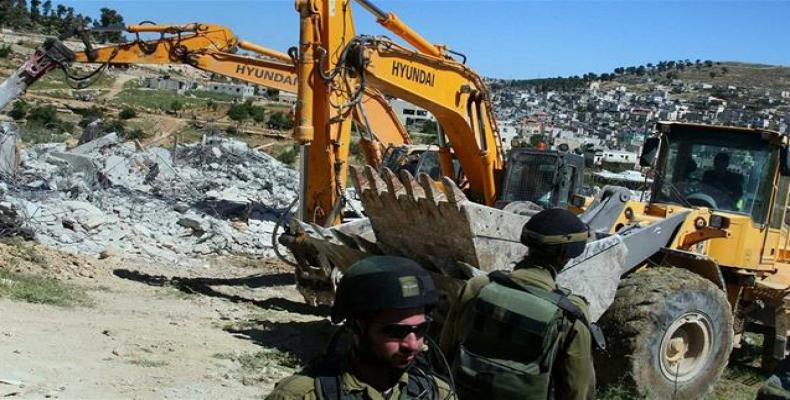Ramallah, May 28 (RHC)-- The Israeli army has threatened to demolish nearly two dozen Palestinian homes in the northeastern part of the West Bank as the Tel Aviv regime continues with its illegal land expropriation policies in the occupied territories and violation of international law.
Sami Sadeq, mayor of al-Aqabah village, said notices have been handed to local citizens, informing that 20 homes, currently uninhabited, would be demolished within the next 60 days for lacking Israeli construction permits. Sadeq added that the homes designated for demolition, nevertheless, have valid construction permits issued by the Construction and Organization Committee of the village.
Aqabah is located in the so-called Area C, which constitutes about 61 percent of the entire West Bank and it is directly controlled by the Coordinator of Government Activities in the Territories (COGAT).
The so-called COGAT is a unit in the Israeli military that engages in coordinating civilian issues between the Israeli regime, the Israeli military, international organizations, diplomats and the Palestinian Authority. The COGAT demands permits for new building projects, however, according to the Norwegian Refugee Council (NRC) -- an international organization that promotes and protects the rights of people affected by displacement -- the majority of planning requests are firmly rejected, leaving international donors and Palestinians alike with no choice but to construct new buildings anyway.
Since 1967, the Israeli regime has been enforcing the draconian policy of demolishing the homes of those Palestinians who are deemed by Tel Aviv to be behind fatal attacks against Israeli settlers. The practice, however, was temporarily halted from 2005 to 2014, with the exception of 2009, when scores of homes were sealed and razed in East Jerusalem.
Nevertheless, in 2014 Israeli Prime Minister Benjamin Netanyahu announced as a policy the resumption of demolitions in the occupied West Bank.
Tel Aviv has been occupying the West Bank, including East Jerusalem, since taking the Palestinian territory by force in 1967. Ever since the occupation, it has been propping up settlements throughout the land, in a move condemned by the United Nations, and considered illegal under international law, which bans construction on occupied territory.
The occupied Palestinian territories have witnessed new tensions ever since U.S. President Donald Trump announced his decision on December 6 last year to recognize Jerusalem as Israel's capital and relocate the U.S. embassy in Israel from Tel Aviv to the occupied city.
The dramatic shift in Washington's policy vis-à-vis the city triggered demonstrations in the occupied Palestinian territories, Iran, Turkey, Egypt, Jordan, Tunisia, Algeria, Iraq, Morocco and other Muslim countries.
On December 21, the United Nations General Assembly overwhelmingly voted in favor of a resolution that calls on the U.S. to withdraw its controversial recognition of Jerusalem as Israeli capital.
In an attempt to avert the resolution, Trump had warned that "we're watching," threatening reprisals against countries that backed the measure, which had earlier faced a U.S. veto at the UN Security Council.
Israel, however, rejected the world body's resolution while thanking Trump for his decision to move the U.S. embassy from Tel Aviv to Jerusalem.
On January 18, the United States reneged on a pledge to contribute $45 million to the United Nations Relief and Works Agency for Palestine Refugees in the Near East (UNRWA), which supports more than 5 million registered Palestinian refugees and their descendants.
The announcement to cut aid to Palestinian refugees came after the U.S. president made a threat to cut off aid to the UN's Palestinian refugee agency.
Israel threatens to demolish more Palestinian homes in occupied West Bank


